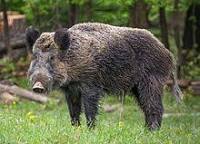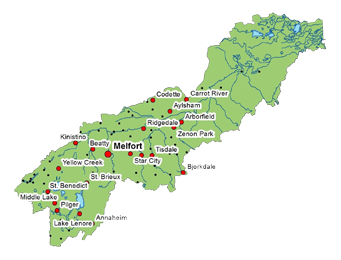
Feral Wild Boar in Saskatchewan
Originally from Siberia, wild boar were first introduced to Saskatchewan as part of an agriculture diversification initiative. Escaping and released wild boar have become invasive throughout the province, and these highly adaptable, hardy, invasive species are prevalent throughout our watershed area. Feral wild boar have very few natural predators, are extremely intelligent, and are known to carry up to 30 different diseases that can harm humans and livestock including E.coli, bovine tuberculosis and foot and mouth disease. They are able to reproduce rapidly, and a sow can have two litters per year with an average of 6 to 8 piglets in each litter. They are omnivores, which means that they eat both plants and animals, and they will eat virtually anything including crops, roots, tubers, worms, insects, bird eggs, snakes, lizards, mice and even deer. They will dig into the ground, rooting for food, and can cause extensive damage to crops, riparian areas and pastures. They have razor sharp tusks, a thick hairy coat, and longer legs than domestic pigs that help them travel through snow. An adult male can weigh up to 300 pounds.
Through their rapid reproductive rate, adaptability, rooting and destructive nature, feral wild boar can have a dramatic impact on our land and water resources including riparian areas, wetlands, grasslands, pastures, crops, and more. These animals are also very dangerous, and will attack any creature that they deem as a threat. Their ability to adapt and thrive in a variety of environments, exponential reproductive rates, and lack of natural predators, have made feral wild boar a problematic invasive species throughout North America.
The Carrot River Valley Watershed Association has been working with Dr.Ryan Brook from the University of Saskatchewan to bring together wild boar researchers, experts, municipalities and the public to discuss this issue and how to develop response plans to feral wild boar. We will be hosting a Wild Boar Symposium on Friday, November 3, 2017 at the Kerry Vickar Center in Melfort. For more information and to register, contact the CRVWA at 306-752-1270.


Leave a Comment